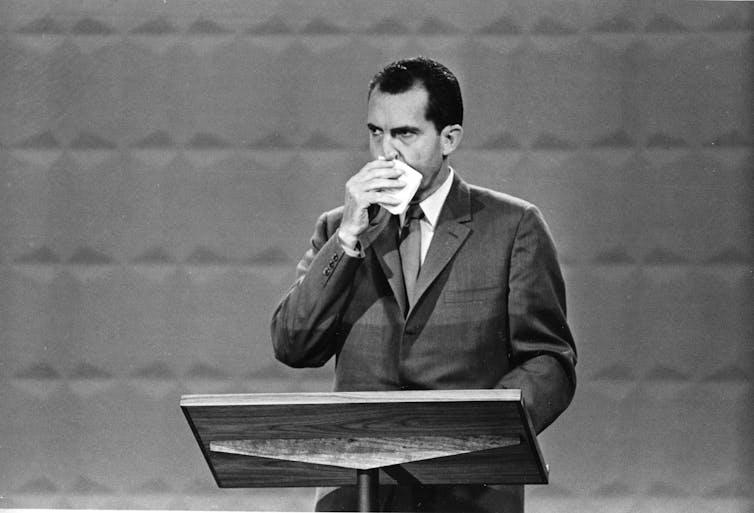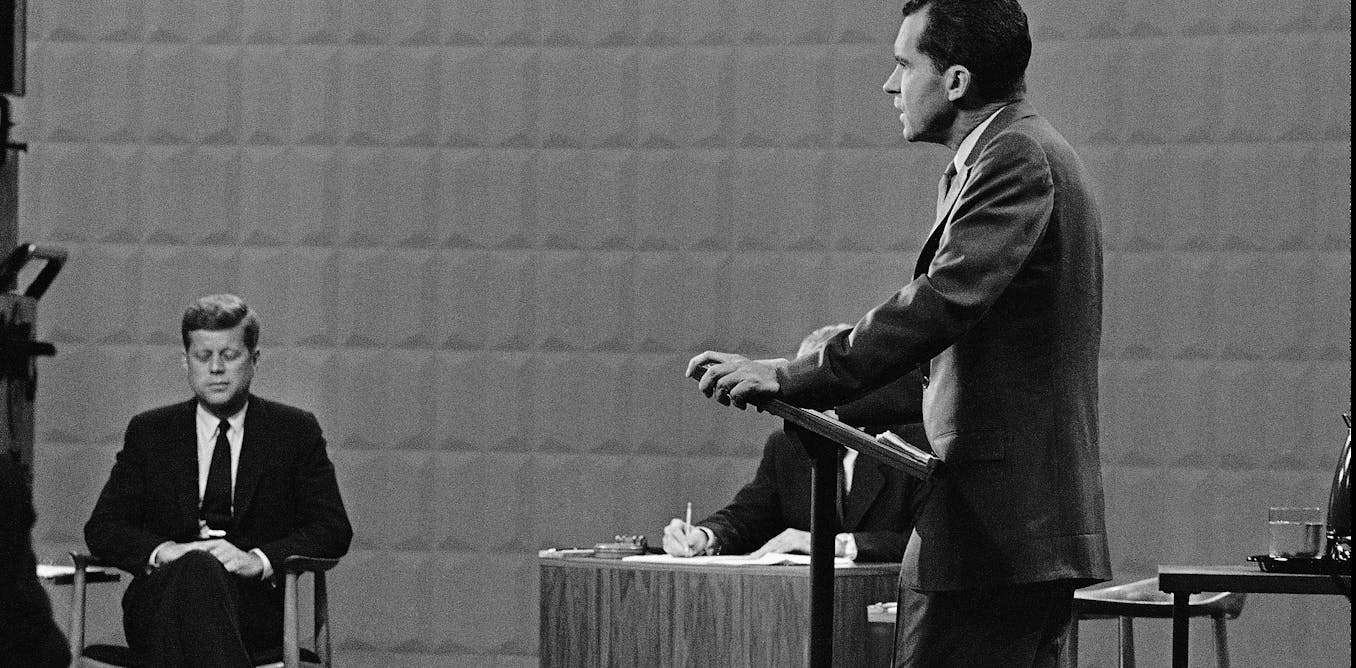The run-up to the Joe Biden-Donald Trump discussion at the conclusion of June 2024 has brought reminders about the very first-ever televised presidential debate – and how Vice President Richard Nixon’s sweaty, haggard visual appeal that autumn evening in 1960 opened a pathway to the White Dwelling for the tanned and telegenic Sen. John F. Kennedy.
That, at minimum, is standard wisdom about the Kennedy-Nixon discussion of Sept. 26, 1960: Image prevailed, satisfying Kennedy and punishing Nixon.
“Kennedy went on to narrowly acquire the election that most say he never ever would have experienced a shot at without the need of that initially discussion,” Time magazine declared in 2016, in recounting the finest missteps in political debates. “It seems Nixon’s deadly flub was in failing to figure out the energy of the visible graphic.”
Or as Max Frankel, then the govt editor of The New York Times, wrote sardonically several months right after Nixon’s dying in 1994, “Nixon missing a Television set discussion, and the Presidency, to John F. Kennedy in 1960 for the reason that of a sweaty higher lip.”
Nixon did perspire below the very hot studio lights, but several pundits and analysts at the time concentrated their commentaries on the vice president’s physical appearance. In a revealing example of the impermanence of in-the-minute judgments, quite a few pundits and analysts imagined both of those candidates appeared anxious and tentative. Some of them reported Nixon, who was still recovering from the consequences of an contaminated knee that had sent him to Walter Reed Military Health care Centre in late August 1960, had the much better of the confrontation.
The prevailing see at the time was that the discussion settled almost nothing about the 1960 race for the presidency.
Affiliated Press
The debate as a draw
What the public is often told these days about that initially-of-its-form discussion, which took put without having an audience in a television studio in Chicago, does not really sq. with reactions and perceptions that circulated at the time. As the debate’s aftermath designed very clear, initial assessments can be fleeting and vulnerable to remarkable revision.
I examined scores of newspaper posts, editorials and commentaries written in the debate’s rapid aftermath in researching a chapter for “Getting It Mistaken,” my 2017 e-book about media-pushed myths. There was, I uncovered, no unanimity amongst newspaper columnists and editorial writers about Nixon’s look. Not all of them thought Nixon’s efficiency was dreadful or that Kennedy was essentially all that appealing.
The Washington Publish, for example, declared in an editorial two times just after the debate: “Of the two performances Mr. Nixon’s was in all probability the smoother. He is an attained debater with a specialist polish, and he managed to express a marginally patronizing air of a learn instructing a pupil.”
The debate moderator, Howard K. Smith of ABC Information, later on was quoted as declaring he thought “Nixon was marginally better” than Kennedy.
Saul Pett, a prominent aspect author for The Affiliated Push, rated Nixon extremely for projecting cordiality. “On basic folksiness, both equally ahead of and throughout the discussion,” Pett wrote in an article posted the working day soon after, “my scorecard confirmed Nixon conveniently in advance, at minimum 8 to 1. … He smiled far more frequently and a lot more broadly, in particular at the commence and close of a remark. Kennedy only permitted himself the luxurious of a quarter-smile now and then.”
Walter Lippmann, a main newspaper commentator of the time, mentioned Nixon’s way deep in his column the day after the discussion, stating television cameras “were extremely tricky on Mr. Nixon. … They built him look ill, which he is not, and they produced him seem older and much more worn than he is.”
The influence, Lippmann wrote, “was a misrepresentation and we must make certain for the potential that the cameras are in point impartial.”

Associated Press
Doubting TV’s highly effective effects
But a different syndicated columnist, William S. White, questioned the effective effects of tv in politics, crafting, “There is, immediately after all, no miraculous way to trip the electronic waves to the presidency: no gold mine of conveniently extracted votes in the Television sky.” Tv was not new in 1960. About 87% of American homes experienced at minimum a single Television established by then. Nonetheless evolving, nonetheless, was television’s job in American politics.
Of increased significance, at least to some analysts, were being Nixon’s techniques in the course of the discussion. He, for illustration, appeared inclined to discuss matters as framed by Kennedy. In his opening statement, Kennedy expressed dissatisfaction with the country’s path amid the uncertainties of the Cold War, expressing, “This is a great place, but I think it could be a increased state and this is a highly effective state, but I assume it could be a much more impressive region.” He wrapped up his opening remarks by stating: “I believe it’s time America began relocating yet again.”
Nixon, who spoke immediately after Kennedy, disputed that the place had been “standing still” all through the Eisenhower decades, but mentioned, even so: “I subscribe entirely to the spirit that Senator Kennedy has expressed tonight, the spirit that the United States need to move ahead.”
He concluded his opening remarks by stating, “I know Senator Kennedy feels as deeply about these challenges [facing the country] as I do, but our disagreement is not about the objectives for The united states but only about the means to achieve those objectives.”
Whether Nixon was attempting to curb his combative tendencies or appeal to wavering Democrats, his remarks came throughout as oddly defensive and deferential.
“Nixon insisted so strongly that he shared all Senator Kennedy’s worthy objectives that a person expected a Nixonian endorsement of the Democratic platform at any moment,” columnist Joseph Alsop wrote, sarcastically, a handful of days after the discussion.
So what altered the consensus about the first debate from being a attract to remaining Nixon’s on-air damage? The remedy no doubt rests in the look for for a submit-election rationalization for Kennedy’s victory. He received the popular vote by .2 share points, or about 118,000 votes.
Historians of the 1960 marketing campaign have pointed out that any of a amount of variables could have tipped the consequence in this sort of a close race. But political journalist Theodore H. White, in his Pulitzer Prize-successful e-book “The Creating of the President, 1960,” argued that televising the very first discussion had been vital.
“Until the cameras opened on the senator and the vice-president,” White wrote in his book, which was printed in 1961, “Kennedy experienced been the boy underneath assault and attack by the vice-president as immature, young, inexperienced. Now, of course, in flesh and behavior, he was the vice-president’s equal.”
Irrespective of whether tv was so revealing and conclusive is arguable. Much less debatable, on the other hand, is the sense right now that tv experienced created a variance. As historian David Greenberg has published about that very first televised discussion, “the perception of television’s affect went on to rework American politics, shaping the conduct of leaders and candidates for a long time.”
To that observation a person could very easily increase: The perception of television’s affect also reworked regular wisdom about the to start with-at any time presidential debate.



